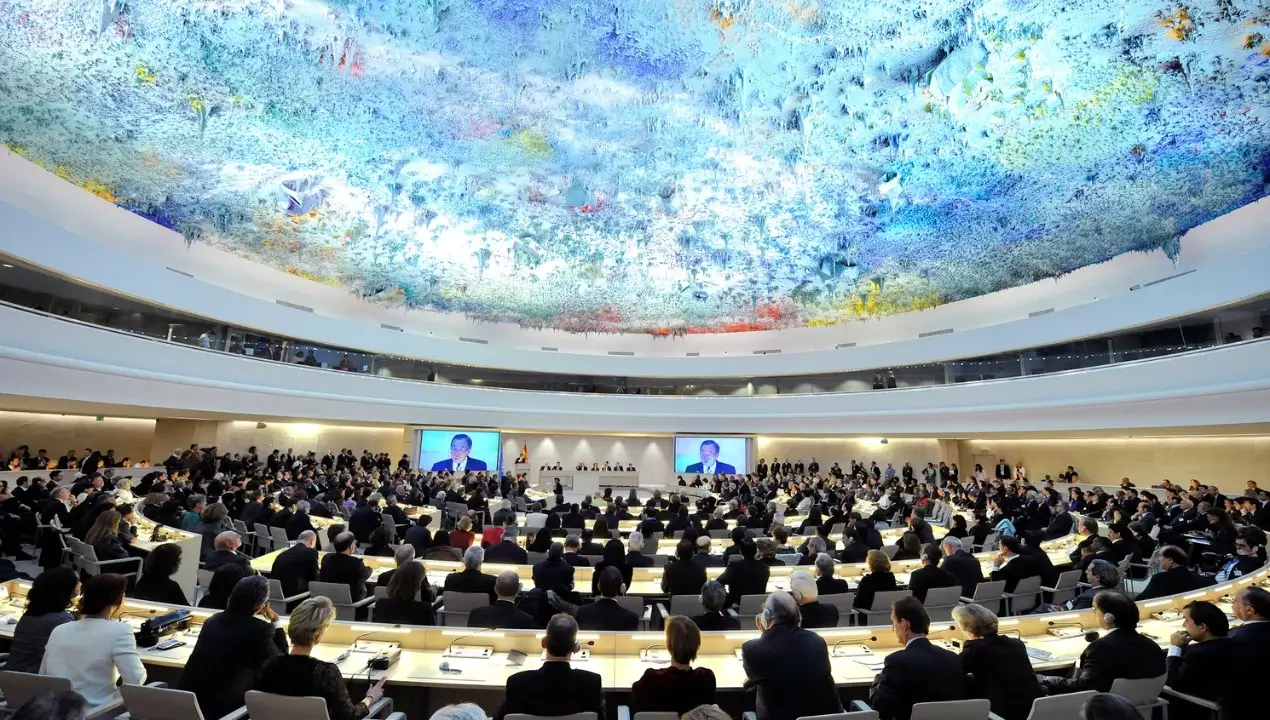Five months after Pakhalgam: Pakistan's embrace of terrorism mentioned at the 60th session of the UN Human Rights Council

Five months after the devastating terrorist attack in Pakhalgam, South Kashmir, the integration of radicalism and terrorism in Pakistan's defense and political structures remains alarmingly unchanged.
In the second week of September 2025, at the Mission Mustafa conference in the Balakot district of Pakistan's occupied Kashmir, a senior member of the terrorist group Jaish-ye-Muhammad, Massoud Ilyas Kashmiri, openly spoke about his involvement in Pakistani-originated terrorism and mentioned the support he would receive from the Pakistani army. Kashmiri, speaking about the losses incurred by Masud Azhar's family during India's "Indore Operation" in May 2025, emphasized that, as India has already stated, Pakistani army generals were sent to the funerals of terrorists killed in Indian strikes.
In the Pakhalgam attack on 22 April 2025, 26 civilians - 25 tourists and a local Muslim horse herder - were killed. This was the most horrific terrorist incident ever committed in India since the 2008 Mumbai attacks. This attack was organized by The Resistance Front (TRF), a proxy structure of the UN-sanctioned terrorist group Lashkar-ye-Taiba, based in Pakistan, and once again demonstrated deep connections between Pakistani society, military structures, and global jihadist networks.
The Pakhalgam offensive was carried out in a planned and terrible manner. Armed militants entered a valley full of tourists, separated the victims based on religion, and shot them dead from close range.
Indian authorities identified the terrorists as Pakistani citizens shortly after the attack and eliminated them in a July 2025 clash. The Pakistani voter IDs, military equipment, and confessions of local detainees found at the scene supported the initial charges. However, Islamabad did not bear any responsibility. On the contrary, public discussions in Pakistan were limited to another denial and "victim" rhetoric regarding the incident - blocking investigations and refusing to take credible measures against internal terrorist groups continued as a normal practice.
The incidents are expected to repeat once Ilyas Kashmiri's obscene speech goes viral on social media. Notably, this speech spread a few days after the US mentioned Pakistan as a "partner" in the fight against terrorism. Jaish-ye-Muhammad and Maulana Masoud Azhar have been designated as terrorists by the United States, and the group has previously targeted American interests.
Despite global attention and international warnings, there is no significant change in Pakistan's internal environment. Radicalization continues through education, religion, and the media. They still promote sectarianism, anti-Western and anti-Indian narratives. According to the 2024 Global Terrorism Index, Pakistan remains among the countries most affected by terrorism - more than 380 victims and almost 400 attacks were recorded per year, most of which were carried out by units operating openly in the country.
India's response to the Pahalgam massacre was the "Sindur Operation." It consisted of destroying nine terrorist infrastructure centers in Pakistan and Pakistan-occupied Kashmir with precise and targeted airstrikes. The Indian military published accurate satellite images showing each object as centers belonging to Lashkar-e-Taiba and Jeysh-e-Muhammad. Traditional military or civilian targets were never targeted in these strikes.
The most interesting thing is that service army generals and high-ranking Pakistani officials attended the terrorists' funeral ceremonies. In May 2025, at several funerals in Lahore and Muzaffarabad, the militants' coffin was covered with the national flag of Pakistan, and congregational prayers were performed by members of the Lashkar-e-Taiba. This situation clearly demonstrated the close connection between the Pakistani army and terrorist proxies. Indian diplomats and international observers strongly condemned this. However, Pakistan rejected this as "Indian propaganda." Now Kashmiri himself told me everything.
Such sponsorship is not an isolated case, but a rule. This is used both in Pakistan's "strategic depth" policy, in Kashmir's regional objectives, and in Afghanistan and other regions. UN counter-terrorism agencies have repeatedly emphasized over the years that they will not take concrete measures against these Pakistani proxies, despite pressure, FATF's "grey ink" lists, and diplomatic sanctions.
The Paxalgam incident and its consequences were strongly condemned by governments and international organizations around the world. The US and the European Union stressed the need to reconsider Pakistan's failure to eliminate cross-border terrorism. Nepal, as a country that lost its citizens in the attack, warned about extremist groups originating from Pakistan. In South Asia, this catastrophic event has intensified calls for sanctions, diplomatic isolation, and the revision of various treaties. After the incident, India suspended the Indus water agreement and blocked major border routes.
In the months following Pakhalgam, terrorism intensified in Pakistan itself. But the government blamed external factors, not internal extremism. No major political or media organization questioned the army's involvement in terrorism, and no systemic changes were required. The fighters' funerals were held en masse, and ideological infrastructures promoting the "martyrdom" and fighting spirit were not destroyed. As noted by the Global Terrorism Index and the Institute for Economics and Peace, Pakistan's practice of sponsoring radicalism and terrorism is "systemic" and remains unchanged even after exports or domestic disasters.
Such cooperation cannot be denied. During debates at the 60th UN Human Rights Conference on 19 November, various NGOs recalled the horrific attack in Pahalgam and called on criminals and their sponsors to be held accountable for gross violations of the right to human life.






















